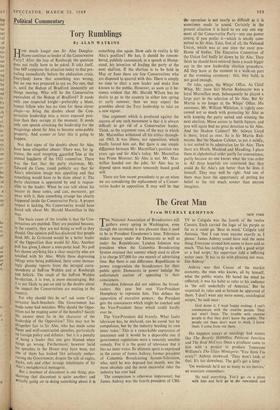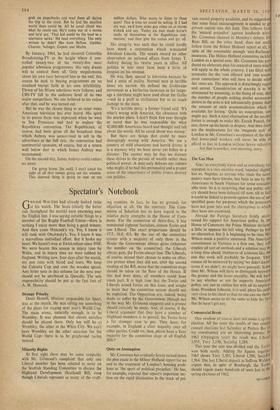The Great Man
From MURRAY KEMPTON
NEW YORK
T01-91-1E National Association of Broadcasters still gathers every spring in Washington, even though the ceremony is less pleasant than it used to be in President Eisenhower's time. Television makes money under the Democrats as well as under the Republicans; Lyndon Johnson was president when the Columbia Broadcasting System attained that summit which used to allow it to charge $57,000 for one minute of advertising time. But there is one difference. Republicans in power congratulate the broadcasters for their public spirit; Democrats in power indulge the unfortunate custom of appealing to their consciences.
President Johnson did not address the broad- casters this year but sent Vice-President Humphrey to represent him. This defines the separation of executive powers: the President gets the consciences which might be touched and the Vice-President those which could hardly ever be.
The Vice-President did bravely. What faults television has, he declared, can be cured 'not by compulsion, but by the industry heeding its own inner voice.' This is a remarkable expression of innocence and it would be a deporable one if government regulations were a remotely sensible remedy. For it is the point of television that it has no inner voice. Its ultimate spirit is expressed in the career of James Aubrey, former president of Columbia Broadcasting System-Television, who, until he was deposed last month, was the most absolute and the most successful ruler the industry has ever had.
The comparison is otherwise impersonal; but James Aubrey was the fourth president of CBS-
TV as Caligula was the fourth of the twelve Caesars. Each carried the logic of his purple as far as it could go. 'Bear in mind,' Caligula told Antonia, 'that I can treat anyone exactly as I please.' James Aubrey could have said the same thing. Everyone around him seems to have said as much. 'This has nothing to do with a good script or a bad script,' his supervisor told a suffering writer once. 'It has to do with pleasing one man, Jim Aubrey.'
Aubrey was that Caesar of the market economy, the man who knows, all by himself, what the public wants. He hated the mind he reflected; it was his habit to refer to his audience as 'the soft underbelly of America.' But he respected its rules and at bottom he approved of them. 'I don't want any more seamy, sociological scripts,' he said once:
God damn it, I want happy endings. I can't communicate with the creative people. They just won't listen. The trouble with creative people is that they don't know the public. The people out there don't want to think. I know them. I come from out there.
His happiest essays at sociology had names like The Beverly Hillbillies, Petticoat Junction and The Real McCoys. Once a producer came to him with a project to produce Tennessee Williams's The Glass Menagerie. 'You think I'm crazy?' Aubrey answered. 'They won't look at that. It's too downbeat. The girl's got a limp.'
'On weekends he'd see as many as six movies,' an associate remembers: He read everything. You'd get on a plane with him and he'd go to the newsstand and grab six paperbacks and read them all during the trip to the coast. But he bad the smallest world there could be. All he cared about was what he could use. He'd come out of a movie and he'd say, 'That kid could be the lead in a television series.' He read everything. The only writers he didn't like were Bellow. Updike, Cheever, Salinger, Capotc and Mailer.
By January, 1964, he had elevated Columbia Broadcasting-TV to the height where it con- trolled twenty-two of the twenty-five most popular television programmes. His only dream was to control them all. Only megalomania about his own taste betrayed him in the end; this season he took to buying programmes on no standard *except faith in his own infallibility. Eleven of his fifteen selections were failures, and CBS-TV fell to the audience level of its two major competitors. No one believed in his voices after that, and he was turned out.
, But he was the closest thing to an inner voice American television has ever heard.. His spirit in its purest form was expressed when he went to San Francisco and had to endure the Republican convention. The Republicans, of course, had been given all the broadcast time which Aubrey was accustomed to sell to the advertisers at the full rate; the convention had commercial sponsors, of course, but at a return well below that to which James Aubrey was accustomed.
On the second day, James Aubrey could endure no more.
I'm going home, [he said]. 1 can't stand the sight of all that money going out the window. This damned thing is going to cost us ten million dollars. Who wants to listen to these guys? This is time we could be selling. If I had my way, we'd have some guy come on at eleven o'clock and say, 'Today six men made horse's necks of themselves at the Republican con- vention: and then give the names and get off.
His integrity was such that he could hardly have stood a convention which nominated Abraham Lincoln. The annals record no other observation on national affairs from James T. Aubrey during his twelve years in office. All politics to him must have been a form of trespass on his revenue.
He was, then, special to television because he had a sense of reality. Normal men in terrible times are narrow. He defined the Goldwater movement as a barbarian incursion in the langu- age a merchant might have used about the Goths —not as a peril to civilisation but as so much damage to the store.
'It's a terrible story,' a former friend said. 'It's what's wrong with America, the obsession with the market place. I don't think Jim ever thought or cared that he was responsible for what 42,000,000 Americans heard and thought and felt about the world. All be cared about was money.'
But there are things that could be more damagingly wrong with America. We are a country of wild obsessions and horrid drives; it is a mystery why we have never yet fallen to a dictator. The answer may be that we. distract these drives to the pursuit of wealth rather than political power. A man only debases our culture who might, if he had this personality and a proper sense of the importance of public events, destroy our politics.















































 Previous page
Previous page